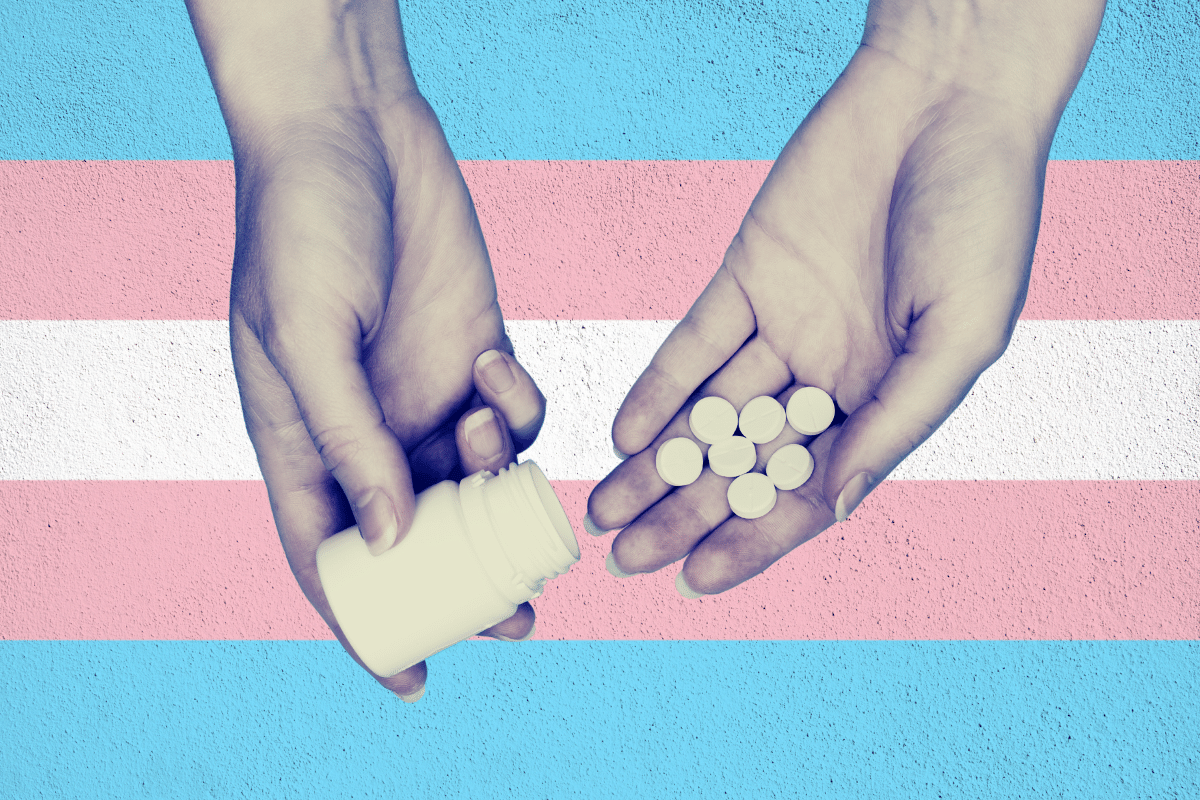Activism
When Sons Become Daughters: It’s Time to Admit That Reflexive ‘Affirmation’ Has Been a Mistake
Teenagers are being told that puberty is a time for them to make decisions about sex and gender, this at a time when they have none of the life experience that would be necessary to make such existential choices.

What follows is the seventh and final instalment of When Sons Become Daughters, a Quillette series that explores how parents react when a son announces he wants to be a girl—and explains why so many of these mothers and fathers believe they can’t discuss their fears and concerns with their own children, therapists, doctors, friends, and relatives. To find out more about how the author collected and reported information, please refer to his introductory essay in this series.
“What are your preferred pronouns?” I ask Rene Jax, somewhat in jest. The answer: “Your Imperial Majesty. Look, you call me what you want. I don’t care. My friends say I’m half this and half that.” Rene (a real name, unlike the pseudonyms I’ve generally been using to describe others) is a 60-year-old male-to-female post-operative transsexual who looks both like a woman (hair, clothing, style of glasses) and a man (hands, Adam’s apple, jawline). My question felt farcical to both of us because Rene has written openly about the pathway that led to transition—and then to regret.
I decide on “he,” since the more we talk, the more I become convinced that our points of agreement and dispute are grounded in the common experience of male sexuality. In some ways, it’s a coin toss. But he likes to tease me, and we’re becoming friends, so I think we can both live with the potential impoliteness of male pronouns.
Rene’s prolific output has included not only autobiographical fare, but also polemics on a wide array of subjects. Perhaps his most well-known work is Don’t Get on the Plane, a 2017 book that implores those toying with the idea of sex reassignment to accept the fundamentals of their biology. (The subtitle is “Why a sex change will ruin your life.”)
Rene even extends his mantra of biological determinism to homosexuality. (He tells me I should find myself a nice girl, which I find a little rude given that he hasn’t even met the more-than-nice guy I’ve already found.) On plenty of issues, we disagree, often profoundly. But if anything, I find our exchanges invigorating: we can both engage in these conceptual debates without taking offence, which is refreshing in an era of misgendering and hate speech. Rene also happens to be a gold mine of knowledge on transgenderism, having spoken to (by his count) more than 2,000 parents whose children were planning to take hormones and have surgery.
In progressive circles—and even among many doctors—it’s become taboo to mention the negative medical consequences of sex reassignment. American detransitioner Sydney Wright puts the situation in stark terms: “I tried my best to find books that discussed the issue critically and offered opposing views, but all I found were pro-transgender authors. That left me with the obvious conclusion: If all the ‘experts’ were in favor of transition, why not do it?” (A detransitioner is someone who reverses his or her former transgender identification or transition.)
Leigh, the female detransitioner who educated me on trans anime culture (as discussed in a previous essay in this series), told me that the clinicians who treat young people too often say little to nothing about the future hurdles they might encounter. In her case, she was told that a synthetic phallus is indistinguishable from its organic counterpart. Many interviewee parents told me that having a candid discussion with their sons regarding the risks and downsides associated with transition is almost impossible; as the sons’ baseline knowledge tends to come from Internet activists who prime teenagers to regard any form of hesitation or caution as thinly disguised transphobia.
When I ask Rene about what these risks entail, he does not trade in euphemisms. Transsexuals who have undergone vaginoplasty (the creation of an artificial vagina) often suffer fistula, the rupture of the colon. This can be triggered by vigorous sex, or simply by a bowel movement, and results in fecal matter being discharged via the neo-vagina. It is a serious medical problem that sometimes is discussed in the media in the context of obstetric fistulas, which typically afflict women in extremely poor areas of Africa and Asia; but whose gruesome details are very much off-message from the glamorous, made-to-order bodies that young men think about when they imagine their transition. How many of them would hesitate if they knew they might defecate—in extraordinary pain—from their neo-vaginas during sex?
The neo-vagina is made from the inverted skin of the penis, presenting another sexual problem: Unless the young man has been especially blessed by nature, there probably won’t be enough material to create an orifice with enough depth to accommodate the average man, making sex painful, even in the absence of a fistula. The neo-vagina lacks elasticity. Nor can transsexuals orgasm, unless the word “orgasm” is defined very abstractly as a general wave of sexual pleasure. Without the sense of release that accompanies ejaculation, the act of coitus can be not only agonizing but unsatisfying.
Then there’s the issue of breasts, which typically develop following the introduction of estrogen into a transitioner’s body. But they often don’t look like normal female breasts, and instead seem more like large swellings around the nipples. They also tend to be in the wrong place for breasts, being closer to the edges of the torso in men than they would be in women. (“They look okay in a sweater,” says Rene. “Not so much without one.”) And so many MtF (male-to-female) transsexuals then go on to get silicone implants, which come with their own costs and medical risks. Overall, the transsexual body tends to require constant attention, updates, and corrections. That’s why Rene wrote his book. “Why increase the chances of your body failing?” he asks.
In many—perhaps most—cases, it should be said, trans-identifying young men don’t have any interest in interfering with anything below the waistline. (An example here is Ellen’s son, Sam, whom I discussed way back in part two of this series.) But it isn’t just surgery that puts the body at risk. “I was speaking at an event with three male-to-females,” Rene recounts. “Every single one of us had a retina come loose at some point or another. It can’t be a coincidence.” He explains that estrogen doesn’t protect the male body from decay in the same way as it protects the female body. “It’s like putting gasoline in a diesel tank,” is his analogy.
Rene is now almost entirely blind in his left eye. He keeps an eyepatch in the glovebox of his car, as the blurry images from his left side are more a distraction than anything else. His retina has detached no fewer than five times; and each time, he’s needed a general anaesthetic to repair it. The process is invasive, and the period of recuperation painful. This isn’t an obvious consequence of reassignment (as opposed to, say, infertility). And it’s important to note that there haven’t yet been any long-range studies on the phenomenon, so the link I am reporting here is strictly anecdotal. But what’s notable is that 20- and 30-something influencers on YouTube don’t even seem to want more medical information. They aren’t thinking about fistulas or fading vision. After all, the most popular figures are the ones living through their early period of euphoric transition into exciting new, female forms. And in any case, young people (trans or not) tend to behave as though they’ll live forever.
Rene is scathing about the contradictions and hypocrisies at play here. “Half of these parents won’t even let their kids eat chickens reared on hormones,” he says. “But they’re seriously considering them for their kids.” He points out the risks of hypertension, which also happens to be a serious comorbidity factor when it comes to COVID-19. “You have to remember,” he says, “We’re dealing with [one of the rare] medical treatments that doesn’t try to return the body to its original state of health.” Cosmetic surgery is another exception, of course. But even in that case, the results are expected to be stable, and not to cause a lifetime of medical follow-up and pharmaceutical dependence.
Our conversation moves from the biological downsides to the social downsides, which, for Rene, are equally worrisome. The transsexual dating pool is vastly reduced; he believes that the resulting relationships are fragile, as they’re built on the knowledge that one of the two bodies is compromised. I find this point a bit bleak; but, as my interview with Menno showed (he was the 40-something gay Dutch man with the cheeky YouTube channel), many people just can’t find the physical form of the transsexual to be alluring, particularly once the underwear is off.
Rene urges me to delve deeper into the social downsides he lists, including the elevated rates of prostitution among transsexuals. But I can only cover so much ground, and many parents are too concerned with the urgent medical risks associated with transition to turn their mind to a child’s later romantic and professional life. But whether the risks we’re discussing are medical or sociological, the same principle applies: candid guidance is in short supply.
This marks out transgenderism as an outlier. Elsewhere in the practice of medicine, there is an expectation that all data will be considered before a patient makes a life-altering decision. Young men questioning their gender are therefore trapped between two extremes: true transphobes who dismiss them as freaks and deviants, and those who are so eager to “affirm” their trans identity that they skip over the health consequences. Each of these two groups poses a risk to trans-identified youth, and each deserves to be held to account.
* * *
Many of the parents I’ve spoken to describe their children as though they were becoming members of a different species. Their sons are renaming themselves after fictional anime characters, and planning to remodel their bodies in acts of homage. The language of transgenderism is often starkly spiritual, suggesting that we are disembodied spirits whose relationship to one’s body is that of mere tenant. Puberty has become a countable noun—“I don’t want to be put through a puberty I don’t want”—as though it’s the soup option on a table d’hôte menu. “If you didn’t like male puberty, what makes you think you’re gonna like the female version?” one mother asked her son. She never got an answer.
Teenagers are being told that puberty is a time for them to make decisions about sex and gender, this at a time when they have none of the life experience that would be necessary to make such existential choices. The fixation on identity labels, coupled with the social isolation and sexual delay that often go along with distress about gender, sometimes results in paralysis. Gender-questioning males who are “hyper-ruminative” (as I described them in the sixth instalment) are often perpetually stuck in setup mode, defensive in regard to whatever tentative decisions they’ve made, but never quite decisive enough to get on with the actual business of living the life they say they want.
This brittleness and delicacy isn’t confined to trans-identifying children, but is a defining quality of this whole generation. And who can blame them for being fearful in the social-media age? A girl in Utah tweets out a picture of herself in a Chinese-style dress and faces hundreds of thousands of micro-acts of disapproval in response. A Scottish teenage lad meets a girl online—except that it turns out not to be a girl. It turns out to be an online blackmail gang, which threatens to release compromising videos of him performing sexual acts on camera, and so he throws himself off a bridge, to his death. Even those of us who are still in our 30s and 40s—hardly senior citizens—will find it almost impossible to imagine what kind of pressures these children face.
Many of the parents I interviewed did manage to bridge the divide, and had relationships with their children which are mostly healthy. When they’re not talking about gender, these parents get along with their children, who inspire and entertain them, and are often great sources of pride. But even in these cases, the parents still feel an underlying sense of anger and frustration. They can’t take on their kids’ schools, even when the schools go against their wishes. They don’t feel like they’ll be fairly treated if they talk to a local journalist covering the gender beat. When their workplaces go in for LGBT consciousness-raising sessions, they’re walking on eggshells, even though none can be described as homophobic (nor anything-phobic, for that matter). They feel that there’s not much point in contacting their political representatives. Aside from anything else, they don’t want a lecture.

This fear can have terrible and unexpected consequences. A Scottish detransitioner called Sinéad Watson has recently written about the effect of her journey on her mother. While Sinéad was going through her original reassignment process, her mother was deep in grief, yet couldn’t articulate this, being afraid that their relationship might deteriorate if she did so. So Sinéad’s mother put a brave face on it, supporting her daughter even as she was doing what she believed was the wrong thing. As Sinéad writes:
She was a grieving mother with nobody and nowhere to turn to, because her grief was painted as transphobic and hateful, when in fact it was the opposite. It was unconditional love for her daughter that forced her to support me and stay by my side even though it hurt her. Nobody ever asked her how she was. Nobody ever checked in to see how she was handling the loss of her youngest daughter. People just kept saying “good for her,” while she cried herself to sleep after looking at my baby pictures. My mum didn’t question or challenge me because she didn’t want to lose me. [But] the gender clinic had no such pressure. It was their job to question and challenge me—to evaluate my (clearly) poor mental health and treat me accordingly. Instead, they handed me HRT [hormone replacement therapy] and surgery … The parents of trans people receive so little support or compassion. It is not transphobic for you to grieve, and don’t let anyone tell you otherwise.
There seems to be little point in blaming either parent or child in this situation. If Sinéad and her mother had been living in a culture where the prospect of such drastic medical changes could be discussed freely, the outcome for their family—and for Sinéad’s body—might have been radically different.
In an online study I conducted, 185 parents answered a range of questions about their children, all of whom had declared a new gender identity of some kind, such as “trans,” “non-binary,” or “gender fluid.” This was a self-selecting group, I should note, as these were all parents who were at least somewhat sceptical enough of the received wisdom in this area, and had taken steps to seek out web resources to help them to understand the phenomenon. But the results are worrying nonetheless. Only 18 percent of parents answered no when asked whether they believed their children saw sexual relations and romantic love as separate or even unrelated concepts. Nearly half attributed their children’s changes in identity, at least in part, to a desire to be part of a positive social movement. Nearly half suspected that their children were trying to get attention. Four-fifths thought that their children had been influenced by spending too much time online. Parents have been complaining about their kids’ lifestyle choices and political convictions since the dawn of time, of course. But rarely have such choices involved committing oneself to the possibility of sterility and a lifetime of medical therapies.
The findings are striking when it comes to differences between males and females. On one hand, there was no statistically significant difference between the sexes in regard to the influence that parents attributed to pornography, sexual abuse, or eating disorders. But the parents of sons were far more likely to describe their child’s dysphoria as being linked, in some way, to online gaming culture. More than one young man told his parents he wanted to be a woman so he wouldn’t end up wielding straight male privilege. Of all the parents of boys who participated in the survey, only half thought their sons actually believed they could really become a member of the opposite sex; and the boys who did believe that such a literal transition was possible were significantly more likely to have received an autism-spectrum diagnosis. Overall, more than 80 percent of boys’ parents reported that their sons were typical boys—in terms of gender norms—in their earlier years, displaying no particularly effeminate traits. Neuro-atypicality, emotional detachment, and fear of sexual development are common characteristics. But contrary to some of the more lurid examples of trans women discussed on social media, these are not sex-obsessed males, let alone budding predators. Just the opposite: they seem terrified of sex.
The typical hyper-ruminative gender-questioning boy, as psychotherapist Stella O’Malley and I call him, is smart, with communication and intellect out of proportion to his social skills. He’s excellent at mathematics in particular, and often in academic pursuits more generally, although this isn’t always reflected in grades. As noted above, he’s likely to have a diagnosis of autism, Asperger’s syndrome or ADHD. He’s sometimes irritated by certain types of clothing; by people yelling; by ticking clocks or rustling noises. As puberty progresses, his psychosexual development lags. He’s very imaginative, and able to construct an alter-ego with extraordinary levels of detail. His Internet usage is even higher than that of his peers, and his online activity causes him to spend even more time thinking about himself. He’s obsessed with anime, and especially anime-themed gaming. But he’s also interested in big questions: Who am I? What could I be? What’s right and what’s wrong? He has a mixed-sex peer group, and often one particularly influential female friend who is even more motivated by social justice and gender revisionism than he is. He seeks approval, not only from friends and online contacts, but also from schoolteachers, counsellors, and therapists. He seems scared of sexual activity and exploration, and sometimes even scared of romance. Maybe he’s been bullied. And he wants an explanation for why he doesn’t fit in, especially one that comes in a form that his friends and classmates will readily understand. Not all of these features are present in every case, of course. But the prototype I am describing will ring true for most of the parents I’ve spoken with, all of whom have come to believe that instantly affirmed sex reassignment is the wrong pathway for their sons.
I stated in my introductory essay, back in early April, that my role was that of a “storyteller.” But in the story I am telling, I am also something of a protagonist manqué: Like Menno, I believe I would have been tempted to follow this same transition pathway had I been born a few decades later than I was.
I had strongly dysphoric feelings in my teenage years, as a consequence of the trauma of parental bereavement. These feelings took well over a decade to process, and perhaps even closer to two. For many years, I could not look in a mirror (I still shave with my eyes closed, by habit). Had the option of quitting my own sex been available to me when I was 14 or 15, I would—in Stella’s words—“have swum across seven oceans” to seize it. As a young man, my misguided efforts to understand what I was suffering took me into the most lightless corners of the Internet, where I made myself the target of grooming at the hands of older, predatory males who encouraged my self-destructive urges, much like Natalie’s son Luke (whom I described in the fourth instalment).
Over the years, I have seen remarkably little effort undertaken by tech giants to stamp out this phenomenon (even as they have moved with lightning speed to censure anyone accused of misgendering). It’s depressing to watch detransitioners who have been exposed to grooming—as well as their parents—doggedly reporting social media account after social media account while billionaires kick back their heels and pronounce themselves LGBT “allies.” It’s equally depressing to hear the political Right blame parents for their intelligent kids’ foolish adventures in the wild west of the online world. These days, a child’s academic success is increasingly predicated on Internet access. Several of the parents I’ve discussed in this series have tried to limit their sons’ online presence. It rarely worked out. (And when it did, the required effort was Herculean.)
There is no doubt that my own experiences biased my approach to the subjects I have explored—though I also think I have been forthright and self-aware about the nature of those biases. In any case, a blindness to the dangers of online grooming is only one of the many unforeseen consequences of affirming all things “trans” on a no-questions-asked basis. It isn’t just predatory behaviour in Internet communities that gets papered over by the most militant trans-advocacy groups; but also depression, anxiety, eating disorders, and early-years trauma, not to mention the profits made by surgeons and hormone providers.
When people who once had dysphoria interact with trans-rights activists, we often are told that we are “jealous” that we didn’t have the “courage” to change sex. To be instructed that the dysphoric ideas that stalked us for years were actually correct all along is insulting, especially coming from strangers: Not only does it imply that the bodies and faces we have come to love are indeed the “wrong” bodies and faces; it also speaks to the spirit of ruthless narcissism that animates many of these activists. Yet it is to these individuals that our media often turns when it is time to “celebrate trans lives.”
If you know parents going through this, talk to them. More importantly, listen to them; provide them with an opportunity to articulate, in Diane’s words, their right to their own souls. If you know a teacher or a doctor or a counsellor or a therapist who feels bound by affirmation dogmas, encourage them to read this series of essays, or Abigail Shrier’s Irreversible Damage, or any of the various excellent analyses that Quillette has made available to the public.
There is a middle ground between dismissing trans-identifying youths as “deviants” and celebrating invasive medical practices as though their consequences were trivial. I would urge everyone to help us reclaim this middle ground, a process that will involve putting aside differences of opinion about what is causing this surge in trans identification. Regardless of what one thinks about Rapid Onset Gender Dysphoria, autogynephilia or any other related issues, one thing is becoming clear about the way we are addressing transgenderism among today’s teenage boys: We have made a mistake.
With thanks to Rene and everyone else who took the time to speak to me—and to Ioana for her help with data analysis. The choice of pronoun I made to refer to Rene in this essay turned out to be prophetic: since writing this final instalment, Rene has surgically detransitioned, and is starting to live again as a man.
Angus Fox (a pseudonym) is an academic working in an unrelated field of study. He can be contacted at [email protected].






